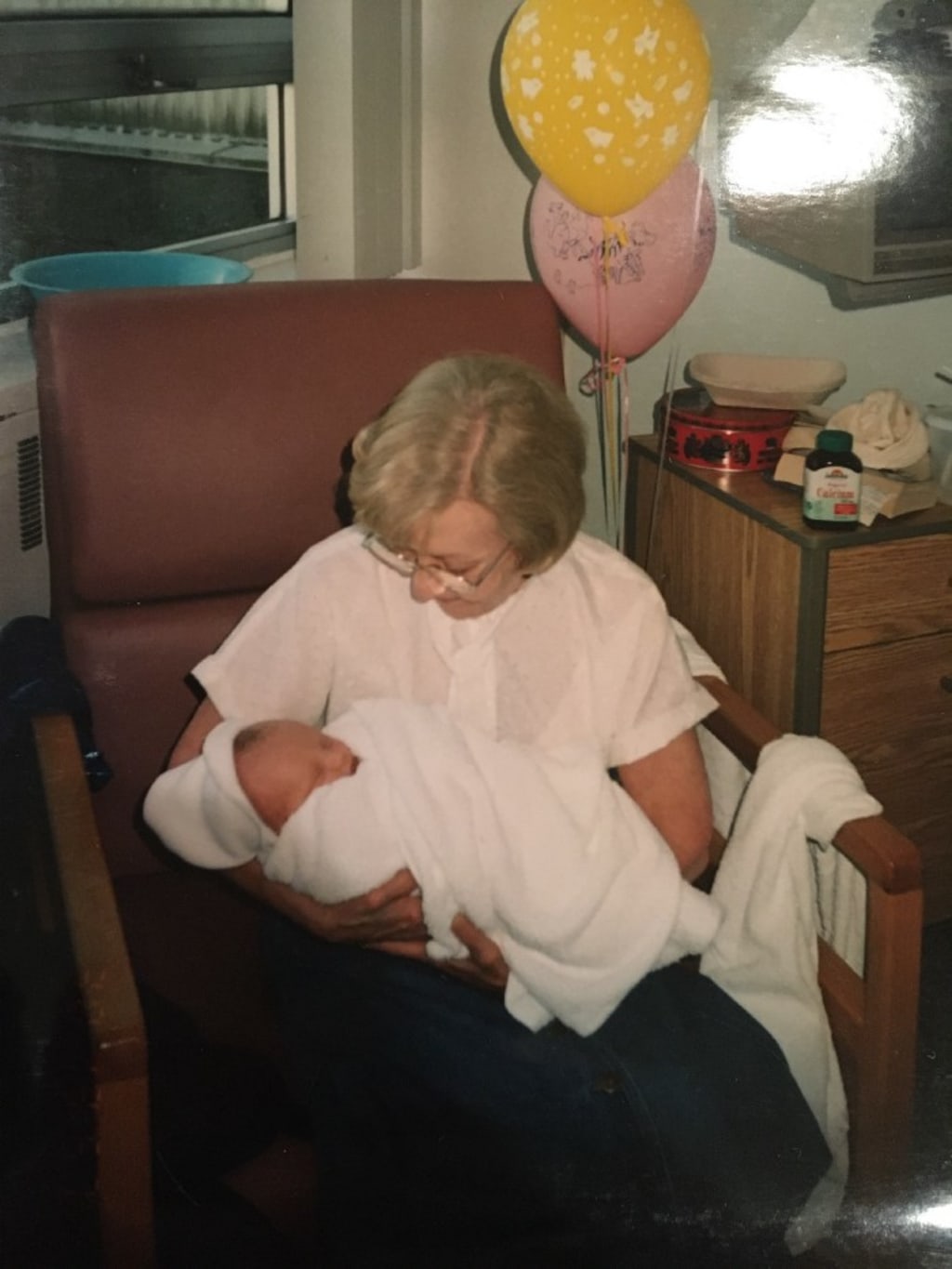My Grandmother’s Eyes
Remembering my grandma three years after her death

People say I have my grandmother’s eyes.
Hers were hazel, with a ring of gold circling her pupils. Mine are much the same. When they catch enough light, they appear moss-green — like the forest surrounding the place I grew up in. Other times, they look almost blue, like my mom’s.
Separated by seventy-something years and a decades-long smoking habit, the skin around Grandma’s eyes was like fragile, translucent tissue paper, whereas mine is still mostly unweathered, except for the dark circles that come from studying and reading late into the night.
When I remember Grandma, I think of the hot summer afternoons we spent crouched around her coffee table, savouring popsicles and examining her collection of angel and cherub figurines as she did her crosswords. Her apartment didn’t have air conditioning, so she always kept the windows open to let in a cool breeze from outside.
Whenever she was tired, she would let me watch her copy of The Wizard of Oz, even when I wasn’t supposed to have anymore “screen-time” for the day. Back then, I didn’t contemplate the fact she resonated with Judy Garland’s character because they were about the same age and shared the same name. Like Dorothy, Grandma also lived with extended family members instead of her parents.
Effervescent and charming, with perfect curls, she could have been Judy Garland or Shirley Temple’s döppelganger. She fondly recalled the Great Depression days when she would play baseball in the park with the other neighbourhood kids and compete in children’s singing pageants. One time, she won against a young and relatively unknown Sammy Davis Jr. She told this story often, what could have been glistening in her hazel-green eyes.
The only difference between Grandma and Dorothy from The Wizard of Oz was she wasn’t an orphan. Nor did she know a real place she could go home to. She was the child of an unmarried couple, deemed illegitimate from birth through no fault of her own. She was excluded from birthday parties and social gatherings because of her parentage — as if her so-called “illegitimacy” was some contagious disease.
Raised by her own widowed grandmother because of her mother’s abandonment, Grandma suffered unimaginable hardships throughout her childhood.
I know because we drove past her old house once. The paint was chipped, and the lawn overgrown, a dog barking somewhere in the distance. Some kids were playing hockey on the street outside.
Dad stopped the car for a moment so we could take in the dilapidated structure that should have held pleasant memories of families sitting around the dinner table and parents tucking their children into bed for the night.
Instead, Grandma’s eyes gathered a heavy sheen of mist as she spoke more to herself than us. “Bad things happened here.”
Despite being a curious young girl, I knew not to ask what things she was referring to. Unspoken boundaries guarded certain areas of Grandma’s life. My grandfather was never mentioned. Neither was the man she had married before my grandfather, or the boyfriends she had after. She sparingly spoke of a boy she dated from one of the wealthy neighbourhoods in our city as a teenager.
What I knew I gathered from snatches of hushed conversation and faded family photographs — one which displayed Grandma on her wedding day with her hair permed and her petite figure adorned in an ivory-white swing dress. She was unrecognizable in that photograph. Despite her tumultuous upbringing, her face was brimming with the youthful optimism of a bride on her wedding day, her makeup done so carefully she belonged in a 1950s bridal magazine. She would become a 1950s housewife for a few years after, like most of the other girls her age, but her life didn’t resemble the neat caricatures shown on television and in the movies. Knowing the ill-fated marriage that would follow always made me feel sad when I looked at that photograph.
In the months before Grandma died, I spent time visiting her in the hospital.
I didn’t truly believe she was going to die. She had been a fixture in my life from the very beginning. I knew she was older than the other grandparents of people my age — she had my dad when she was in her early forties — but despite her short stature and weathered lungs, I somehow thought she was invincible. After a life of hardship and loss, she had become strong. She still talked about playing baseball in the park by her old house, and her sense of humour remained intact through it all.
As her memory waned, followed by her ability to even speak, I realized the inevitable.
I read the Psalms to her — her favourite book of the Bible — and prayed. Grandma wasn’t a cookie-cutter Christian, but she loved Jesus. He had carried her through life’s fiercest storms. As I read aloud from the Psalms, my voice wavering in the quiet hospital room, I knew He was carrying her then, too.
On a warm spring day, we walked into Grandma’s hospital room. Her delicate frame appeared even smaller against the massive pillows propping up her back. She was thin, her veins appearing indigo and navy against her pale skin.
By that time, she had lost her ability to talk. But her silence was enough. Each person spoke to her about how much they loved her and said their goodbyes. I don’t recall what I said. I only remember her opening her eyes to see us one last time. They were warm and gold against the sun pouring in through the window, brimming with a peace that seemed to suggest she knew exactly what was going to happen and wasn’t scared of it.
We didn’t hear the news until that night. My mom told me Grandma had died, her eyes wide and tearful.
Wordlessly, I grabbed a pair of running shoes from the closet and jogged outside, the cool night air slapping my face. I walked in circles through the darkness with my heart thumping against my chest. Closing my eyes to the night sky, I remembered the serene expression that had dwelled in her hazel-gold gaze — wanting to imprint the memory on my soul so I would never forget.
As I walked home with tears streaming down my face, somehow I knew she was playing baseball in heaven.
About the Creator
Ilana Quinn
I am a student who loves writing about history, travel, faith and life experiences. Feel free to check out more of my writing at https://linktr.ee/ilanaquinn :)






Comments
There are no comments for this story
Be the first to respond and start the conversation.